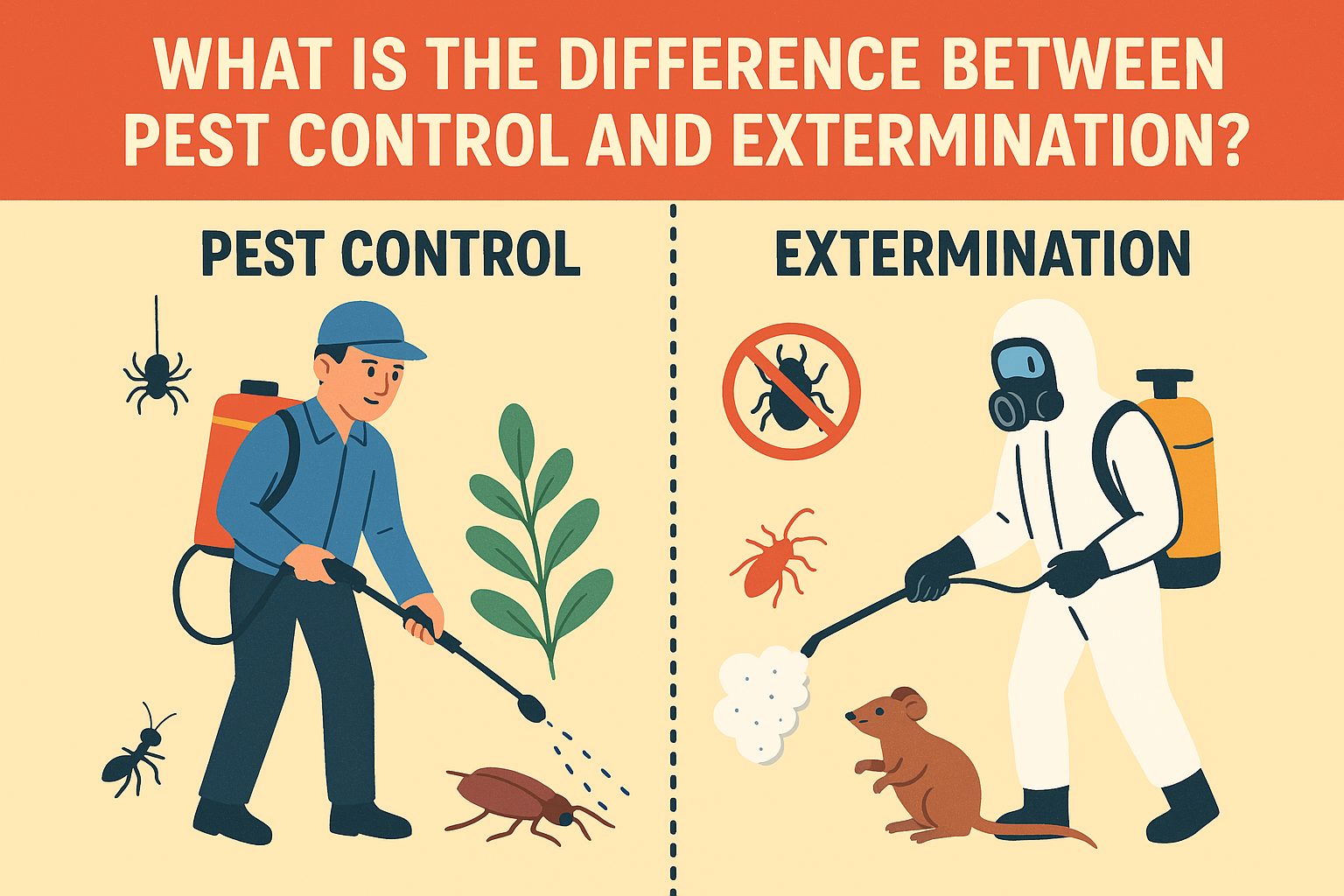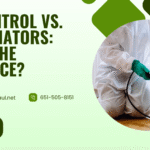Dealing with pests is a common challenge for homeowners. Whether it is ants in the kitchen, rodents in the attic, or termites in the foundation, pests can disrupt daily life and even cause damage to your property. Understanding the difference between pest control and extermination is essential to choosing the right approach for your home. While many people use these terms interchangeably, they actually describe two distinct strategies for managing unwanted pests.
Pest Control St Paul focuses on creating a safe and healthy living environment through preventive and ongoing measures. Unlike extermination, which reacts to existing infestations, pest control takes a proactive approach to managing pest populations. It not only aims to remove pests but also prevents future problems by identifying the root cause of the infestation and addressing it effectively.
What is Pest Control?
Pest control is a long-term strategy for managing pests. The main goal is not just to eliminate existing pests, but to maintain a safe and pest-free environment over time. This approach considers the overall ecosystem of your home or property and focuses on prevention, monitoring, and management of pests before they become a serious problem.
One of the key advantages of pest control is its proactive nature. Rather than waiting for an infestation to reach critical levels, pest control specialists regularly inspect homes to identify conditions that could attract pests. Common preventive measures include sealing cracks and entry points, reducing moisture in problem areas, cleaning up food and waste sources, and making repairs to structural issues that could provide shelter for pests.
Pest control often employs Integrated Pest Management techniques. This method combines multiple strategies to manage pests in an environmentally friendly and safe way. Pesticides may be used, but only as one part of a broader plan that includes non-chemical methods. By addressing both the pest and the conditions that allow it to thrive, pest control offers a comprehensive, long-lasting solution for homeowners.
What is Extermination?
Extermination is a reactive approach that focuses on removing pests immediately. The primary goal is to eliminate an existing infestation quickly and efficiently. Unlike pest control, extermination does not address the underlying causes of the problem. It is a short-term solution designed to provide immediate relief.
Extermination methods are often aggressive and involve heavy use of chemicals or specialised equipment. For example, fumigation, heat treatments, and toxic baits are common methods used to eradicate pests quickly. While these techniques are effective at removing pests, they do not prevent future infestations if preventive measures are not taken afterwards.
Extermination is most appropriate for situations where a pest problem has become overwhelming or is causing significant damage. For example, a termite colony that has already started to damage a home’s foundation requires immediate extermination. However, relying solely on extermination without following up with pest control measures can lead to recurring infestations.
Key Differences Between Pest Control and Extermination
Understanding the differences between these two approaches is important for homeowners who want to protect their property. Here are the main distinctions:
- Purpose
Pest control is preventive and ongoing. Its purpose is to manage pest populations and prevent future infestations. Extermination is reactive, with the goal of quickly eliminating an existing problem. - Approach
Pest control involves a comprehensive strategy that addresses both pests and the conditions that attract them. It often includes inspections, preventive treatments, and non-chemical methods. Extermination focuses solely on removing pests, often using chemical treatments or other aggressive methods. - Duration of Effectiveness
Pest control provides long-term protection, as it targets the root causes of infestations and reduces the likelihood of recurrence. Extermination provides immediate results, but without preventive measures, pests are likely to return. - Environmental Impact
Pest control usually emphasises environmentally friendly techniques and responsible pesticide use. Extermination relies heavily on chemical applications, which can be harsh and have a larger impact on the surrounding environment. - Cost Considerations
While pest control may seem more expensive upfront, it can save money in the long run by preventing costly damage caused by pests. Extermination may be cheaper initially, but repeated infestations can make it more expensive over time.
When to Choose Pest Control
Homeowners should choose pest control if they want a long-term, sustainable solution. Pest control is ideal for preventing infestations before they occur and for managing low-level pest activity in a safe and environmentally conscious way. Regular pest control services can also improve the overall hygiene and health of your home, reducing the risk of diseases carried by pests.
In addition, pest control is suitable for properties that have seasonal pest problems. For example, in St Paul, homeowners may experience increased ant or rodent activity during certain times of the year. Pest control plans can be tailored to these patterns, providing ongoing protection that addresses seasonal risks.
When to Choose Extermination
Extermination is the right choice when there is an immediate, severe infestation that requires urgent action. For example, if a rodent problem is causing structural damage or a termite colony is actively harming your home’s foundation, extermination can provide fast relief.
However, it is important to remember that extermination alone is not a complete solution. Once the immediate problem is resolved, pest control measures should be implemented to prevent future infestations. Combining extermination with ongoing pest control ensures both immediate results and long-term protection.
Combining Pest Control and Extermination
In many cases, the best approach is to combine pest control and extermination. Extermination can handle severe infestations that threaten immediate damage, while pest control ensures that your home remains protected over time. This combined strategy is especially useful for homeowners who want a safe, pest-free environment without constantly dealing with recurring problems.
For example, a homeowner who discovers a termite infestation may first call for extermination to eliminate the colony. Afterwards, a pest control plan can be put in place to monitor the property, treat vulnerable areas, and prevent future infestations. This way, the home is protected both now and in the future.
Conclusion
Understanding the difference between pest control and extermination is essential for making informed decisions about protecting your home. Pest control offers a long-term, preventive solution that addresses the root causes of infestations, while extermination provides a short-term, reactive solution for immediate problems.
For homeowners in St Paul, choosing the right approach can mean the difference between ongoing pest problems and a safe, healthy, pest-free home. By evaluating the severity of the infestation, the potential risks, and the desired outcome, homeowners can determine whether pest control, extermination, or a combination of both is the best choice.
Investing in a comprehensive pest management strategy not only protects your property and belongings but also contributes to the overall well-being of your household. A proactive approach ensures lasting results, reduces future expenses, and provides peace of mind, knowing that your home is protected against pests year-round.
FAQs
- What is the main difference between pest control and extermination?
Pest control is a long-term, preventive approach that manages and reduces pest populations, while extermination is a short-term, reactive method aimed at quickly eliminating an existing infestation. - Is pest control better than extermination?
Pest control is ideal for long-term prevention, whereas extermination is best for urgent situations. Often, combining both strategies provides the most effective solution. - Can I do pest control on my own?
Basic preventive measures like sealing cracks, cleaning food sources, and reducing moisture can be done by homeowners. However, professional pest control ensures comprehensive protection and addresses root causes effectively. - How quickly does extermination work?
Extermination works immediately to remove pests, often within hours or days, depending on the severity of the infestation. - Does extermination prevent future infestations?
No. Extermination removes current pests but does not prevent new ones from entering unless followed up with pest control measures. - How often should I schedule pest control services?
Frequency depends on the type of pest, the property’s condition, and seasonal risks. Many homeowners in St Paul schedule quarterly or monthly treatments for consistent protection. - Are pest control treatments safe for pets and children?
Yes, professional pest control focuses on safe and environmentally friendly methods. Technicians ensure that treatments minimise risks to pets and family members.







